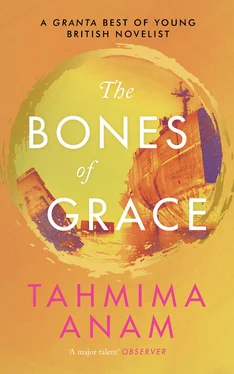Rashid left Chittagong the next afternoon, and over the course of the following week, I slipped into a routine. An early breakfast, then a walk through the estate with Joshim, he holding a long stick and pointing out the names of the trees. After a few hours of reading, I ate lunch in the kitchen with Komola and the other servants. It took some arguing to get them to agree to let me eat with them, but I told them that I was lonely sitting at the long dining table all by myself. There was another cook, a maid, a guard, and a young girl who did the laundry and dusted Dolly’s furniture. In the evening, there was a bath, and more reading, and falling asleep to the sound of the wind through the open window. ‘Bou-ma doesn’t like air conditioning,’ I overheard Komola saying to the others.
I was turning my thoughts to returning home when I received a call from my mother’s friend, Rubana. I had, in fact, been thinking of Rubana on the very day she telephoned, recalling the last time I had seen her. It was a few weeks after my wedding, at the home of one of Dolly’s distant cousins, Sweetie. Sweetie had invited a large and superbly groomed group of friends to her house in Baridhara, and Rubana had stuck out in her plain clothes and lack of makeup. I had known Rubana since childhood and had always been a little afraid of her. That evening she appeared bored, looking often at her phone and wandering out into the garden with her hands around a mug of tea. I followed her and she looked me up and down, a giant red teep punctuating her forehead, and asked me what I was doing, not, what are you doing, dear? But What the hell do you think you’re doing? At least, that is how I heard it. What the hell did I think I was doing, I regularly said to myself. It made me feel a little better in the way that stating something obvious can do. ‘I’ve been thinking about you,’ she said now. ‘I heard you were in Chittagong.’
‘Yes, at my in-laws’.’
‘Oh, yes, the hill. Is Rashid with you?’
‘No, I came on my own.’
‘Escaping already? Wise woman.’ Rubana herself was married, but no one ever saw her husband. I imagined a small, whiskery man who shuffled around in a lungi and didn’t dare raise his voice above a whisper.
‘I know someone who’s working on a project. It’s in Sithakunda, about an hour from you. Have you heard of shipbreaking?’
Shipbreaking. Yes, I knew what it was. Places on the beach where they tore ships apart. Every few months you would read a story in the papers about how one of the workers had died in a fire or been crushed under falling steel.
‘There’s a British researcher who wants to do a documentary, but none of the workers are talking to her. You could go and help her make inroads. Translate. We have some local people there, an NGO called Shipsafe, but somehow it’s not clicking.’
The prospect of someone instructing me to work, to actually make something happen, gave me a sense of what I had wasted. Except Moby-Dick , I couldn’t recall the name of a single book I’d read in the last twelve months. I blamed Bart, the failed dig, but really I had just been stubborn, clinging to my coveted title, palaeontologist, not realising that it had been taken away from me and that I should just accept this instead of becoming one of those people I’d always hated. And why hadn’t anyone said anything? My mother, who crammed every day with a hundred useful, life-or-death activities, had remained silent as I had slept through the better part of a year.
‘I don’t know anything about it,’ I said.
‘Doesn’t matter. Use your wits.’
I mumbled an excuse about not being well, and heard Rubana sigh into the phone. She was weighing me up, judging my temperament, and finding me lacking.
‘Too bad,’ she said. ‘It’s probably not for you anyway. You’d have to move out of that fancy house and into the office quarters — it’s the only way you can have constant access. I don’t imagine you can survive without air conditioning.’ I found myself telling her about Dera Bugti. The overnight bus to Kashmore. Camp beds. Chiselling in the sun. The prospect of leaving this house, not to return to Dhaka, but to go elsewhere, was a possibility I hadn’t dared consider. What would I tell everyone? But if I accepted a job, and if that job took me away from here, then it was out of my hands.
‘You’re a fairy godmother,’ I said to Rubana.
I told Rashid the following weekend, when he came to see me. ‘But I’m here to bring you home,’ he said. He raked his hair with his long, blunt fingers. I was exhausting him, but he couldn’t deny me, not after what had happened. At Dolly’s house, the dining chair would have been removed from the table. I wondered where the chair was, whether it was sitting discarded in a storeroom somewhere, or whether it had been sent back to the shop so that the fabric could be replaced, and who was doing this task, and how it been explained, and did they have to pay extra for the blood, for the workmen’s disgust?
I left it to Rashid to break the news, both to my parents and to his. He tried to persuade me to stay at Khondkar Villa — the driver would bring me back and forth — but I refused, hoping the accommodation in Sithakunda was terrible, suddenly yearning to get far away from the plush, unpopulated spaces of his house. I said goodbye to Komola and Joshim, meaning it when I said I would miss them, promising to return whenever I needed a good night’s sleep or a proper meal.
The next day Bilal, the Shipsafe coordinator, picked me up in a battered jeep. I climbed into the front seat beside him and we sped down the hill. Bilal had recently married, and he flicked through photographs of his wedding on his phone while navigating us out of the city. I commented on the loveliness of his bride. She looked not unlike how I must have appeared just last year, a line of tiny flowers in the parting of her hair. We took a route that skirted the sea. Oil refineries lined the road on one side, and high walls separated the road from the coast on the other, and, out in the water, giant oil tankers and container ships waited to load or dump their cargo. Then we turned inland, getting stuck in traffic almost immediately. Hunched over the steering wheel, Bilal simultaneously complimented his wife’s beauty and complained that Chittagong was no better than Dhaka, now that trade was booming. He pointed to a gate. ‘See,’ he said, as if I should understand. The sign said EXPORT PROCESSING ZONE. Then the traffic cleared and we sped through, leaving the low buildings and overhanging wires of the city behind, turning to a sky that was bright and open.
A few miles into the Dhaka — Chittagong highway, the gentle hills breaking up the horizon disappeared, and we were suddenly confronted with the complicated detritus of broken ships. Bilal gestured to the vast scrapyards of things that looked like they’d been rescued from a warzone: broken refrigerators, oxygen tanks, rows and rows of lifebuoys, toilet bowls, washing machines, metal cages he referred to as compressors, and then a string of antique shops that housed, he told me, compasses and brass trinkets and lanterns and other things that had been found on board. Then, passing a number of furniture shops, open storefronts displaying battered sofas, bunk beds, filing cabinets, office desks, he said sometimes they pretended the stuff came from the ships when actually it was made right there on the road.
Bilal kept casting curious glances my way, because I had hardly made a sound or exclaimed at the strangeness of the landscape, which must have been rare; he was probably used to people talking about how bizarre it all looked, like a glimpse into an apocalyptic future where everything was salvaged and half-broken. But I was numb to all of it, pleased by the sight of something that matched the chaos I felt within me. It was only when we passed through the gates of Prosperity Shipbreaking, and I saw an oil tanker in the final stages of being pulled apart, a felled dinosaur of metal lying on its side with the curved blades of its propeller exposed, that I was unable to hold back from cursing out loud. ‘What the fuck?’ I blurted out, and Bilal smiled, as if he’d just won a bet.
Читать дальше












